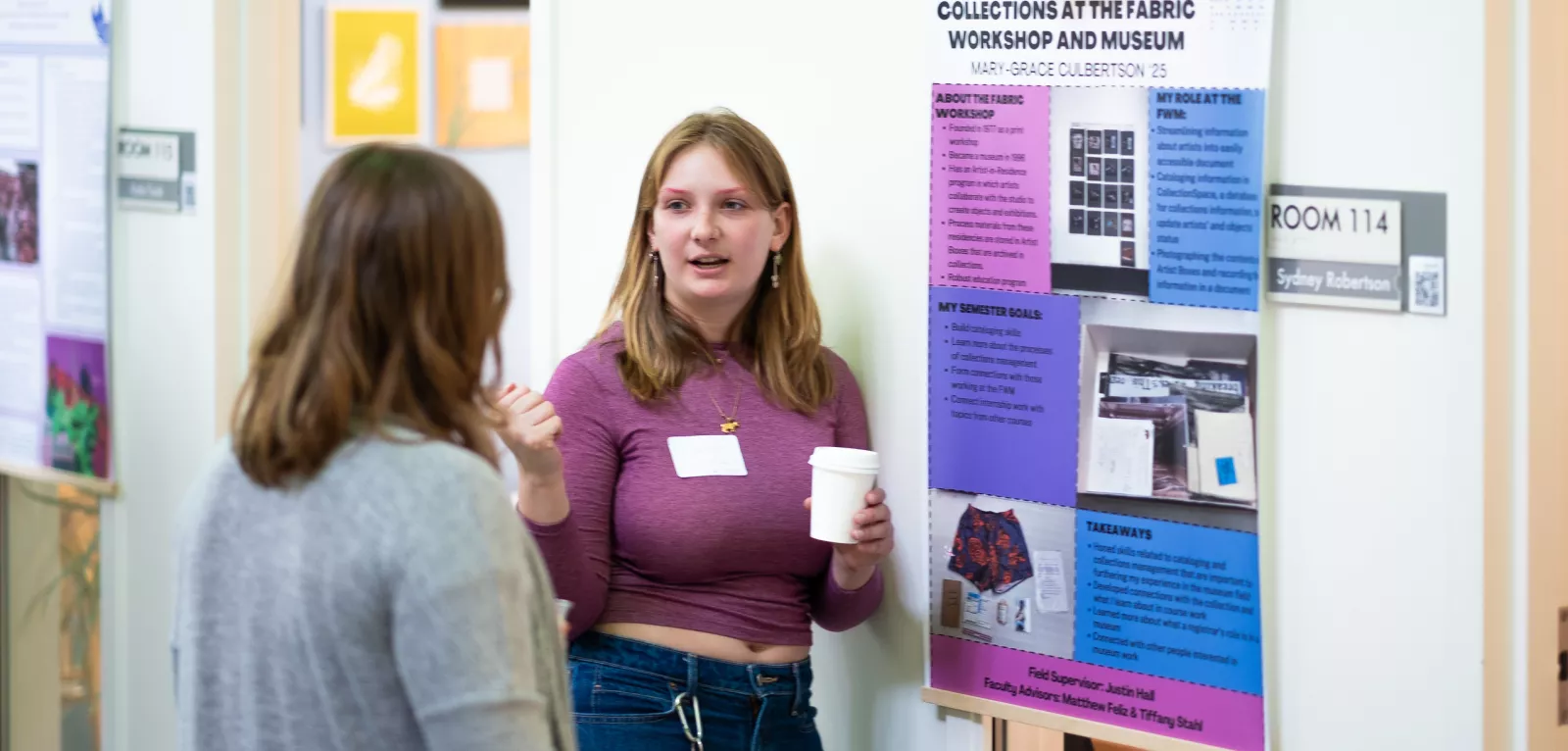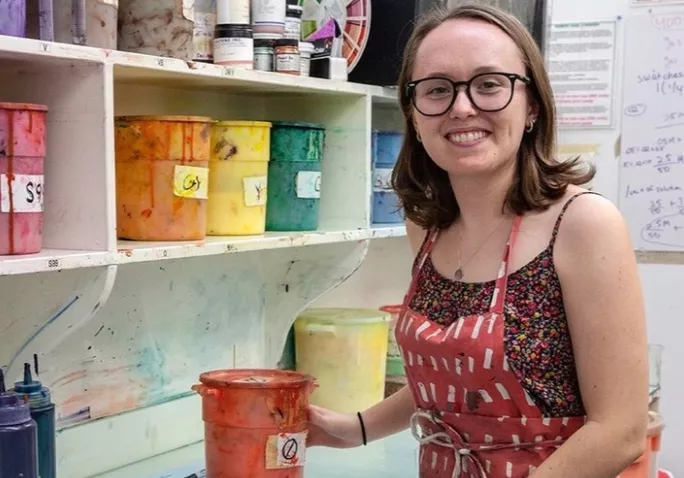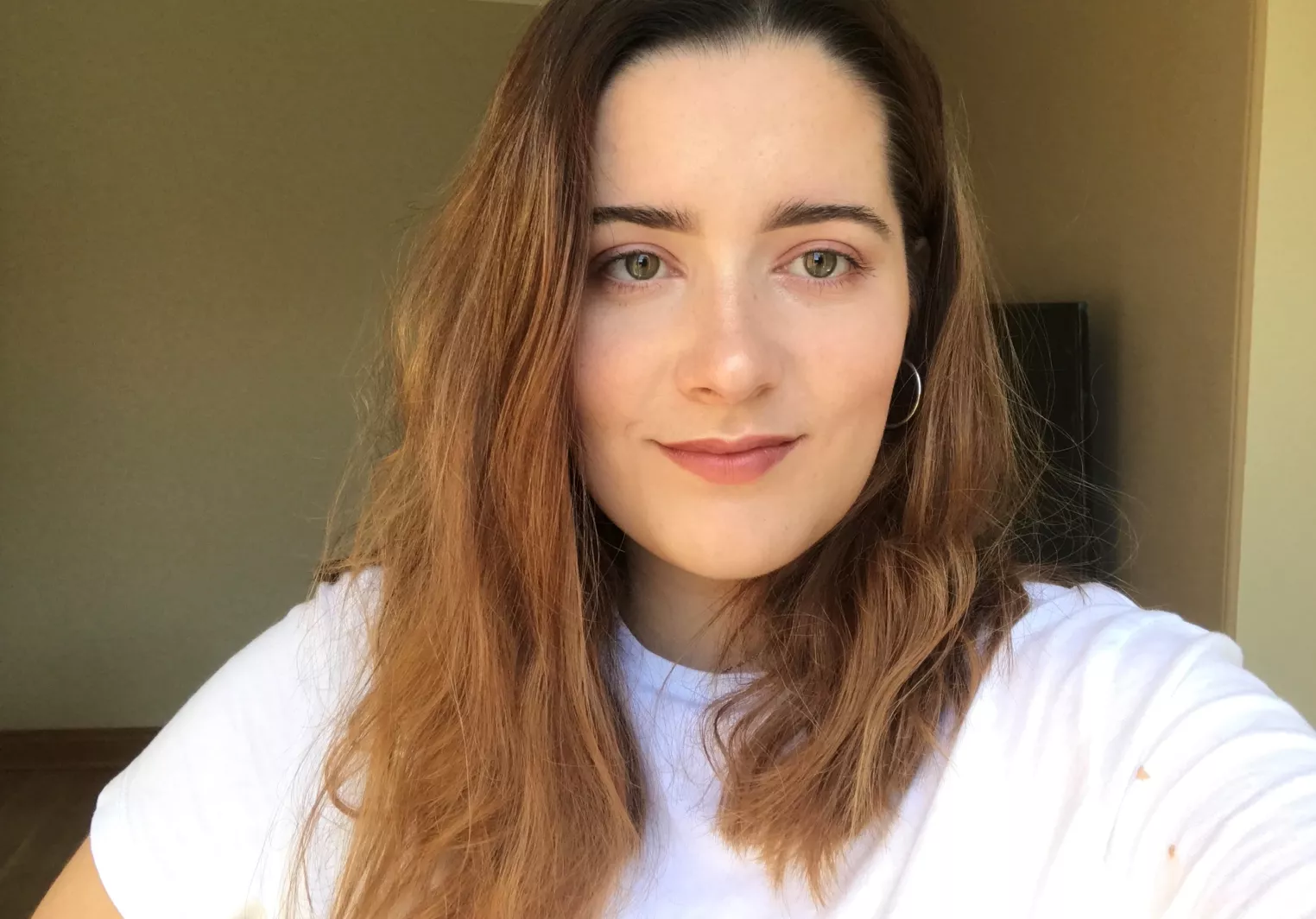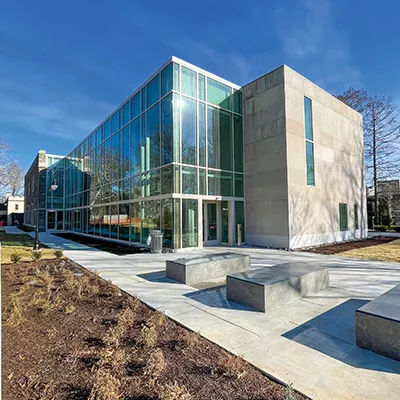
Academic Opportunities: Praxis
Praxis is a curricular, experiential, and community-engaged learning (CEL) program. It integrates theory and practice through collaboration with community partners as part of academic courses.
Visit our Praxis Course Offerings page to explore current and upcoming Praxis courses.
Questions? Please contact Liv Raddatz at lraddatz@brynmawr.edu or Tiffany Stahl at tstahl@brynmawr.edu.

Praxis III Course Proposals
Interested in a Praxis III course for next semester? Submit a Praxis III Proposal by the end of pre-registration to participate in Praxis Independent Study or a Praxis Seminar.
Our Praxis Model
Praxis integrates applied learning into academic courses through collaboration with community partners, bridging students’ classroom experiences with meaningful engagement in broader social, cultural, and institutional contexts.
Praxis placements and projects are designed to foster mutually beneficial, equitable partnerships with communities or organizations that serve both student learning goals and community partner needs. These collaborations are built on a foundation of shared objectives, clear communication, joint decision-making, and a respect for community expertise.
There are three types of Praxis courses, Praxis I, Praxis II, and Praxis III, which involve an increasing amount of experiential and community-engaged learning but do not need to be taken successively.

Praxis I
Praxis I courses offer opportunities for students to begin building community connections related to the course topic. Course components may include:
- Visits to local organizations
- Engagement with guest speakers from community groups
- Assignments centered on local issues
CEL activities are limited to two hours per week or 20 hours per semester and make up less than 25% of the course content.
Praxis II
Praxis II courses include a more substantial CEL component. They incorporate structured, collaborative engagements or projects with community partners. Activities may include:
- Regular engagement in nonprofits or schools
- Research requested by a community partner
- Co-creating tools or programs with the community partner
The time commitment for the CEL component in Praxis II courses varies from course to course but falls within the range of two to seven hours per week or 20-70 hours per semester, representing 25–50% of the coursework.
Students in Praxis II courses complete a CEL Agreement outlining roles, goals, and responsibilities, co-signed by the course instructor, Praxis Site Supervisor, and the Praxis Coordinator for the course.
Praxis III
In Praxis III courses, students secure their own CEL site with guidance from Praxis staff and work 8-10 hours per week with the community partner. The applied CEL component makes up 75% of the coursework and is directly related to the learning objectives of the course. All Praxis III courses are evaluated on a pass/fail basis.
There are two ways students can engage in Praxis III:
- Designing a Praxis Independent Study course
- Participating in a Praxis Seminar (course offerings vary)
You can learn more about each track below.
Both Praxis Independent Study and Praxis Seminar courses require students to plan and prepare well in advance during the semester before enrollment.
Interested students should schedule a consultation with Praxis staff and submit a Praxis III Proposal Form that outlines their interests and goals. The proposal is due the semester before taking the Praxis III course and must be submitted by the end of Bryn Mawr's pre-registration period.
Praxis Independent Study
In this Praxis III track, students work one-on-one with a faculty member to develop a course around a self-identified academic interest and a sustained engagement with a Praxis community partner (e.g., an internship).
This option requires:
- 8–10 hours/week of engagement at the Praxis site
- Regular meetings with a Faculty Advisor (every other week)
- A Praxis Learning Plan prepared with guidance from the student’s Faculty Advisor and Praxis Site Supervisor
Praxis Independent Study students also participate in regular Praxis cohort sessions and an end-of-semester Poster Session organized by Praxis staff.
Students must be in their sophomore year or up and in good academic standing to participate in Praxis Independent Study. Approval by the student’s Dean or Major Advisor is also required. Students are eligible to take up to two Praxis Independent Study courses during their time at the College.
Interested students should schedule a consultation with Praxis staff and submit a Praxis III Proposal (see above).
Praxis Seminars
In this Praxis III track, students working with independent but connected Praxis host sites come together as a seminar. Led by a faculty member, students meet regularly as a group to reflect on their CEL experiences as they relate to a common academic focus of the course.
Praxis Seminars:
- Are taught by a faculty member
- Include students working with different community partners
- Meet approximately eight times per semester
- Require 8–10 hours/week of work with a community partner
While the Praxis Seminar model also requires students to secure their own Praxis Site, it does not entail designing a full course as in the Praxis Independent Study track.
Interested students should schedule a consultation with Praxis staff and submit a Praxis III Proposal for the seminar of interest (see above).
FAQ: Creating a Praxis Independent Study Course
Students interested in a Praxis Independent Study course should be sophomores or above and in good academic standing. There are no specific prerequisites. (Students are not required to complete a Praxis I or Praxis II course beforehand.) Each student may take up to two Praxis Independent Study courses during their time at the College.
Start by visiting the Praxis website and Praxis Blog. There, you can explore past Praxis Independent Study courses, which may help you begin thinking about your academic and community engagement interests. Consider attending a Praxis Info Session, which is typically offered during pre-registration. Next, schedule a one-on-one appointment with Praxis staff to discuss your interests and goals.
Come to your Praxis consultation appointment with an initial idea of your academic focus and learning objectives. Praxis staff will help you refine your goals and explore how community-engaged learning (CEL) can support your academic inquiry.
Praxis Independent Study credit is granted through an academic department, so consider which department aligns best with your topic. You must also identify a Faculty Advisor who will mentor you throughout the course.
You will need to secure a CEL site. If you already have a specific organization in mind, contact them to discuss your goals. If not, Praxis staff and faculty can help you identify potential CEL sites and contacts.
Using this information, you will submit a Praxis III Proposal. Your Academic Dean and the Praxis Program staff must approve your proposal. Once approved, you will complete a Praxis Learning Plan, outlining your academic goals and CEL placement details. This plan must be signed by your Faculty Advisor, your Praxis Site Supervisor, and the Praxis Program staff before you begin the work with the community partner.
After your Learning Plan is fully approved, the Praxis staff will notify the Registrar’s Office. The Registrar will then create a course registration number. If your Praxis Independent Study course does not appear on your schedule or transcript, contact the Registrar’s Office.
Yes. Praxis students are reimbursed 100% for public transportation expenses related to their course. Information about travel reimbursement and expense forms is available on the Praxis and Civic Engagement websites.
Due to the individualized nature of each Praxis Independent Study course, there is no master list of CEL site opportunities. The Praxis Blog can serve as a good starting point. Praxis staff, faculty, and Academic Deans are also excellent resources for site suggestions.
Internships typically provide an opportunity to gain applied experience in a workplace setting, often without academic credit. Praxis Independent Study courses also involve community-based work, but they are structured around academic inquiry and reflection.
Praxis students develop specific learning objectives connected to an academic discipline and engage with community partners in ways that advance both academic and civic goals. Students receive academic credit for their Praxis Independent Study and work closely with a Faculty Advisor to integrate their CEL experience with academic learning.
Praxis Course Highlights
Visit the Praxis Blog to learn about past Praxis courses, community partners, and student projects.
Archived Praxis Blogs: Spring 2022 | Fall 2021 | Spring 2021 | Spring 2020
Marcia Adams '21 on Designing a Praxis Independent Study Course

Praxis Resources for Faculty
Join the friends_of_praxis@brynmawr.edu listserv to connect with faculty and staff members at Bryn Mawr who share an interest in community-engaged and experiential learning and to receive Praxis-related resources and program updates.
Send an email to friends_of_praxis@brynmawr.edu or lraddatz@brynmawr.edu to subscribe.
The College is a member of PHENND (the Philadelphia Higher Education Network of Neighborhood Development) and Campus Compact. Both of these organizations have syllabi directories and other resources for faculty from member institutions.
Faculty can also schedule a consultation with Liv Raddatz and Tiffany Stahl if they are interested in incorporating a CEL component into a new or existing course.
Praxis and Civic Engagement have established many connections with community-based organizations in the region and will share this network with faculty who are looking for ways of integrating a CEL component into a course.
Some of the most helpful advice about Praxis course design comes from other faculty who have already taught Praxis courses. We are in touch with many BMC and HC faculty who teach CEL courses in various disciplines and would be glad to make suggestions about whom to contact.
Praxis Program staff are happy to work with faculty on their courses at any stage of development.
Questions? Contact Liv Raddatz at lraddatz@brynmawr.edu or Tiffany Stahl at tstahl@brynmawr.edu.
Praxis staff members Liv Raddatz and Tiffany Stahl work closely with faculty teaching Praxis courses. Each faculty-Praxis Coordinator team functions differently, depending on the course's needs, the professor's desired level of Praxis Coordinator involvement, and the Praxis Coordinator's background and availability.
Typically, the Praxis Coordinator develops and coordinates student CEL placements for the course. This includes identifying appropriate community partners for the course, matching students with Praxis sites, maintaining regular communication with the Praxis Site Supervisors (including at least one Praxis site visit during the semester), troubleshooting as needed, and administering evaluations of the CEL site experience.
The Praxis Coordinator is also available to assist with designing the CEL Agreement form and facilitate an in-class orientation before students begin working with the community partner, as well as lead in-class reflections or discussions related to the CEL placements. Typically, the Praxis Coordinator attends class at least once a week to become familiar with the course material and get to know the students.
The Praxis Coordinator may also be available to bring in speakers or visitors from the community organization with which the course is partnered. Funding for speaker honoraria is also available from the Praxis budget.
Students in Praxis courses receive reimbursement for their transportation expenses. In some cases, Praxis can also fund transportation for group field trips. Groups of students in Praxis courses can travel in BMC vans if the group has a certified BMC van driver. The Praxis Program handles both scheduling and paying for van transportation. Bryn Mawr students who serve as van drivers for their Praxis courses can be paid for driving.
Important Links

Contact Us
The Career & Civic Engagement Center
Phone: 610-526-5174